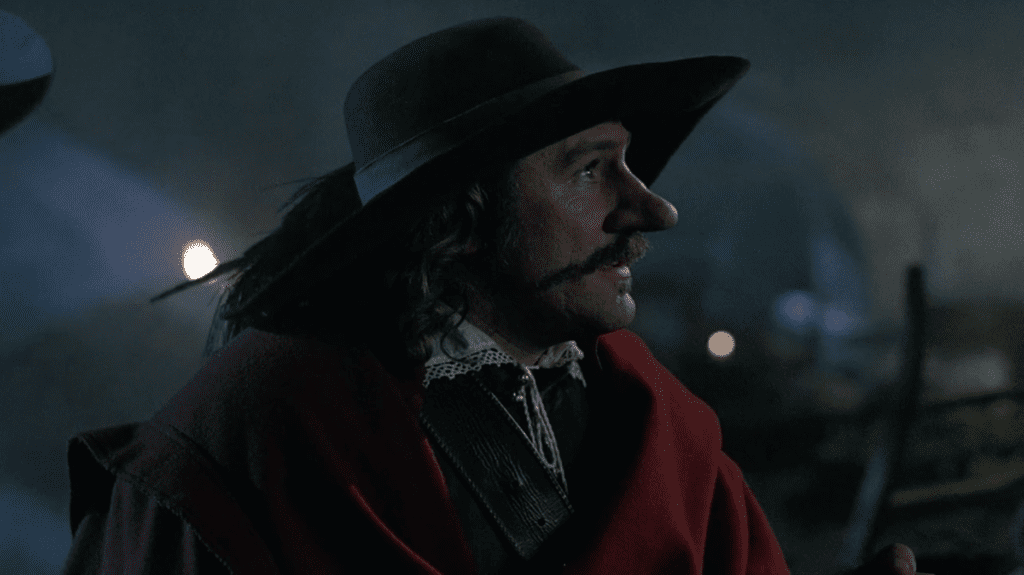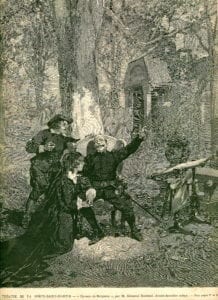
It is difficult to face the review of a work as Cyrano de Bergeracby Edmond Rostand, published in 1897, and performed that same year in Paris. It has been said of her that, to criticize her, one must be French, and even then one must walk with leaden feet. After all, represents the spirit of the Gallic country, in the same way that Don Quixote embodies that of the Spanish people.
Cyrano de Bergerac It is a theatrical drama in five acts, written in verse, and which narrates the character and life of the character that gives the play its title. Although Cyrano existed in real life, the vision that Edmond Rostand offers us does not fit the historical character, as it is very romantic and idealized. Rostand considered Cyrano de Bergerac not only his greatest work, but also the ultimate cause of his fall from grace. Of her he said: "I, amid the shadow of Cyrano, and the limitations of my talent, I have no other solution than death." But what is it that makes this text so special, and why is it so hard to beat? Who is, or what does this philosopher, poet, and swordsman represent?
A self made man
CYRANO.
Cyrano never begs for protection;
I have no protector:
(Putting the hand to the sword)
Yes protective!
There are, in my opinion, three points around which the plot of this play revolves. The first of them is the «self made man. » Cyrano is a proud guy, a musketeer, and a writer who would cut off a hand rather than change a single comma from his books to please the nobleman, or patron on duty. He despises with all his soul the "sold" and, in order to maintain his independence and freedom, he does not fear poverty, cold, and ostracism. As he himself says, his motto is: «Die, Yes! Sell me, no!“What's more, he seeks this isolation almost obsessively, as a way to reaffirm himself, and to show the world that nothing and nobody can break his soul.
LEBRET.
If to repress it was right
your spirit ... musketeer,
have glory, money.
CYRANO.
And at what price will it reach it?
What means would I use?
Gave. Looking for a protector
and growing in your favor
like the ivy that persists
the firm trunk embracing,
licking the crust,
smoothing its roughness
gradually climbing
the cup? Do I grow like this?
I for cunning to elevate myself?
Of my wits not remembering
nor with my effort count?
This desire to have free will, and not to depend on others, can be perfectly appreciated in the famous Cyrano's monologue in the second act. The version of the eponymous 1990 film by Jean-Paul Rappeneau, and with the main role played by Gérard Depardieu, this is reflected:
A love triangle
CYRANO.
Alone, in the dark, we guess
that you are, that I am, that we love each other ...
You, if you see something, it is only the blackness
of my cape; I see the whiteness
of your light summer tunic ...
Sweet enigma, that flatters the pair that amazes!
We are, my sweet good,
you a clarity and I a shadow!
The second point is a love triangle, the relationship between Cyrano, Roxana, and Cristián. Our protagonist, who is considered a horrible being because of his oversized nose, does not dare to declare his love for Roxana for fear that she will reject him. This fear increases when she discovers that she is in love with a young cadet, Cristián, who has all the physical attractiveness that Cyrano does not possess. However, Cristián is a man with little lip, especially when talking to women. So he turns to Cyrano himself to write love letters to Roxana on his behalf.
ROXANA.
I love you! Encourage!
Live! ...
CYRANO .— (Smiling with effort)
The story I do not ignore.
They said to him: "I adore you!"
to a prince, and his ugliness,
«INRI" in love of his cross,
suddenly felt extinct
to the sweet melted influx
of that phrase all light.
What is not a story? I am ok;
but I heard that phrase ...
and you see, I was deformed,
and I'm still deformed.
This situation culminates in the wedding between Roxana and Cristián. For his part, Cyrano, although he tries to fool himself, and to believe that he is glad the mere fact of confessing his love through Cristián, deep down he knows that it is a lie. But, as stubborn as ever, he never admits it, not even when evidence emerges that the letters were written by him, and Roxana ends up falling in love with his feelings, despite Cristián's beauty.
A personal tragedy
CYRANO.
This my existence has been:
Aim! ... be forgotten! ...
Do you remember? Under the balcony
Cristián of love spoke to you;
I, in the shadow, pointed at him,
slave to my condition.
I underneath, to suffer
and with my desire to fight;
others up, to reach
the glory, the kiss, the pleasure.
It is law that I applaud judiciously,
with my luck in good agreement:
because Molière has a genius,
because Cristián was beautiful.
The last point is personal tragedy by Cyrano. His reward for a life dedicated to being true to himself, to fighting for his own honor, is misunderstanding and being cut off from society. This is the great drama, and the terrible moral of the play: that in this world those who conspire like rats are the ones who are victorious, and those who go forward, and have a sense of dignity and honor, are doomed.

Illustration representing the final scene of Cyrano de Bergerac.
Cyrano de Bergerac is a tragic figure, but also a model; It exemplifies our aspirations as human beings: freedom, individualism, courage, resourcefulness… all these ideals, and many more. He is, and no other, the highest representation of man's struggle against a society that seeks to alienate him. Contrary to what you might expect, being a role model does not help you to achieve any happiness, but rather it propels you strongly towards your own destruction. Like Christ on the cross, Cyrano must die, with his proud hat on his head, to make us reflect, to cleanse us of our sins, and teach us that humanity can be much more than it is.
CYRANO.
Ah, I feel converted
in marble! ... But, I am Cyrano,
and with the sword in hand
serene I wait and stand tall! […]
What do you say? ... What the victory
who yearns for it does not reach it? ...
If there is no hope of triumph
there is hope of glory! ...
How many are you? Are you more than a thousand?
I know you! You are the Anger!
The prejudice! The lie!
The cowardly and vile envy! ...
What do I agree to? ... Do I agree? ...
I know you, Stupid!
There is no such fold in me!
Die, yes! Sell me, no!
With me you are going to finish:
No matter! Death I wait
and, as long as it arrives, I want
fight… and always fight!
You will take everything from me!
Everything! The laurel and the rose!
But keep one thing
that you will not be able to tear me away!
The mud of dishonor
it never splashed it;
and today, in heaven, leaving her
to the plants of the Lord,
I have to demonstrate without embarrassment
that, oblivious to all vileness,
was a paragon of purity
forever; and it's ... my plume.
I have come here because of the reference that was made to this book in another novel. I congratulate you for the review; concise and limited, but of an admirable depth. Thank you for removing the misfortune of not knowing Cyrano from me.
Greetings good man.
Thank you very much, I am glad you liked the article.